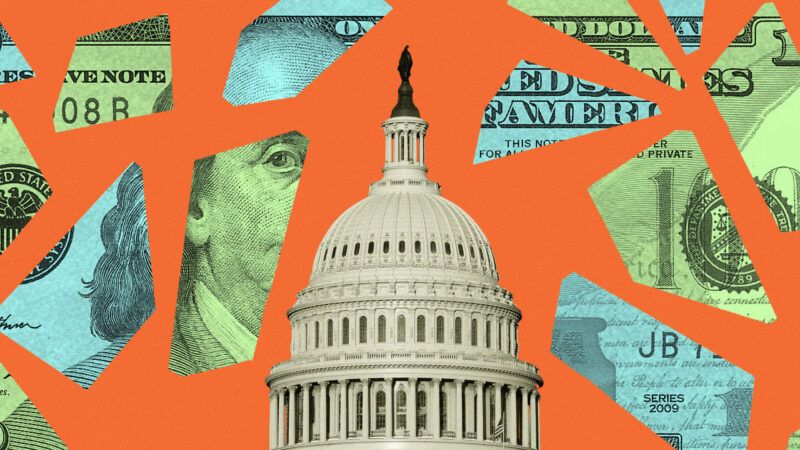Congress Should Not Give Any Government Agency Financial Free Rein
Lawmakers should proactively retake the power of the purse from the Consumer Financial Protection Bureau, regardless of how the Supreme Court rules.

Can Congress give away its power of the purse to a regulatory agency? That's the important constitutional question the Supreme Court decided it will take on earlier this week. Regrettably, the Court can't answer the obvious follow-up question: Why would a legislature give away its own core authority?
Congress created the Consumer Financial Protection Bureau (CFPB) in 2010, in the wake of the Great Recession. The agency wields sweeping authority over "consumer finance," including everything from credit cards and car payments to mortgages and student loans. To this end, the agency writes and enforces rules imposing even billion-dollar penalties. Thus, the CFPB regulates millions of private citizens and businesses.
In this manner, the CFPB is no different than scores of other alphabet-soup agencies—the EPA, the SEC, etc.—with similar powers over different sectors of the economy (alas). With the CFPB, however, Congress tried something new: They gave a blank check to the regulatory powerhouse.
Rather than pleading with Congress for appropriations, like other agencies of its ilk, the CFPB simply takes what it wants from the Federal Reserve (up to 12 percent of the Federal Reserve's operating expenses, or $734 million in 2022). The CFPB, moreover, may roll over any unused funds into the next year. Last year, the CFPB took $641.5 million, and the agency has another $340 million in rollover money. Indeed, the CFPB's architects believed it was "absolutely essential" that the new regulator be "independent of the Congressional appropriations process."
But does the Constitution allow this sort of bureaucratic "independence" from Congress?
The Constitution's appropriations clause gives the power of the purse exclusively to Congress. On this, the Framers were quite deliberate. "The legislative department alone has access to the pockets of the people," explained James Madison in The Federalist Papers: No. 48. The general idea was that the people, through their representatives, should have a say in the disposition of their money. In addition, the appropriations clause also plays an important role in the separation of powers. As George Mason put it in Philadelphia in 1787, "the purse and the sword ought never to get into the same hands." Among other benefits, making agencies dependent on Congress for their annual budget allows elected representatives to police bad behavior by taking away money when the agencies act contrary to congressional intent.
In 2018, a group of lenders challenged the CFPB in federal district court, arguing that the agency's funding mechanism contravenes the appropriations clause. Although the district court sided with the government, the 5th Circuit reversed that decision, holding that "Congress's decision to abdicate its appropriations power … violates the Constitution's structural separation of powers." Subsequently, the government sought review by the Supreme Court, which was granted earlier this week. Next term, the Court will consider the constitutionality of the CFPB's blank check from Congress.
For more than a century, Congress has given away, or "delegated," much of its lawmaking authority to the federal bureaucracy. Last year, for example, regulatory agencies issued 3,168 final rules, while Congress passed 247 bills, according to regulatory scholar Wayne Crews.
Throughout much of the 20th century, lawmakers tempered these delegations through oversight and control of the purse strings. In the last few decades, however, an increasingly polarized Congress has abandoned meaningful engagement with the federal bureaucracy. In part, this decline is owed to the ascension of political party over institutional pride, such that half of Congress loses interest in runaway executive power whenever "their guy" occupies the Oval Office. And in part, it's due to electoral calculus: By avoiding hard decisions, lawmakers can evade political accountability. Adding it all up, the result is a modern Congress that does something as feckless as yielding its power of the purse to the CFPB.
Congress' hands-off approach to the CFPB reflects a fundamental breakdown in the Framers' design. A Congress that gives away its most important authority may be said to lack ambition. That's a big problem, because the Constitution's structure assumes that lawmakers would act the opposite. To prevent a dangerous concentration of power, the Framers divided government into three branches (legislative, executive, and judicial) and gave each the means to check the others. The animating principle, as James Madison famously explained in The Federalist Papers: No. 51, is to let "ambition … counteract ambition." A supine Congress undermines the separation of powers, which is a crucial bulwark for liberty.
Congress must rediscover its ambition, period. A good place to start would be for lawmakers to proactively retake the power of the purse from the CFPB, regardless of how the Supreme Court rules.


Show Comments (25)